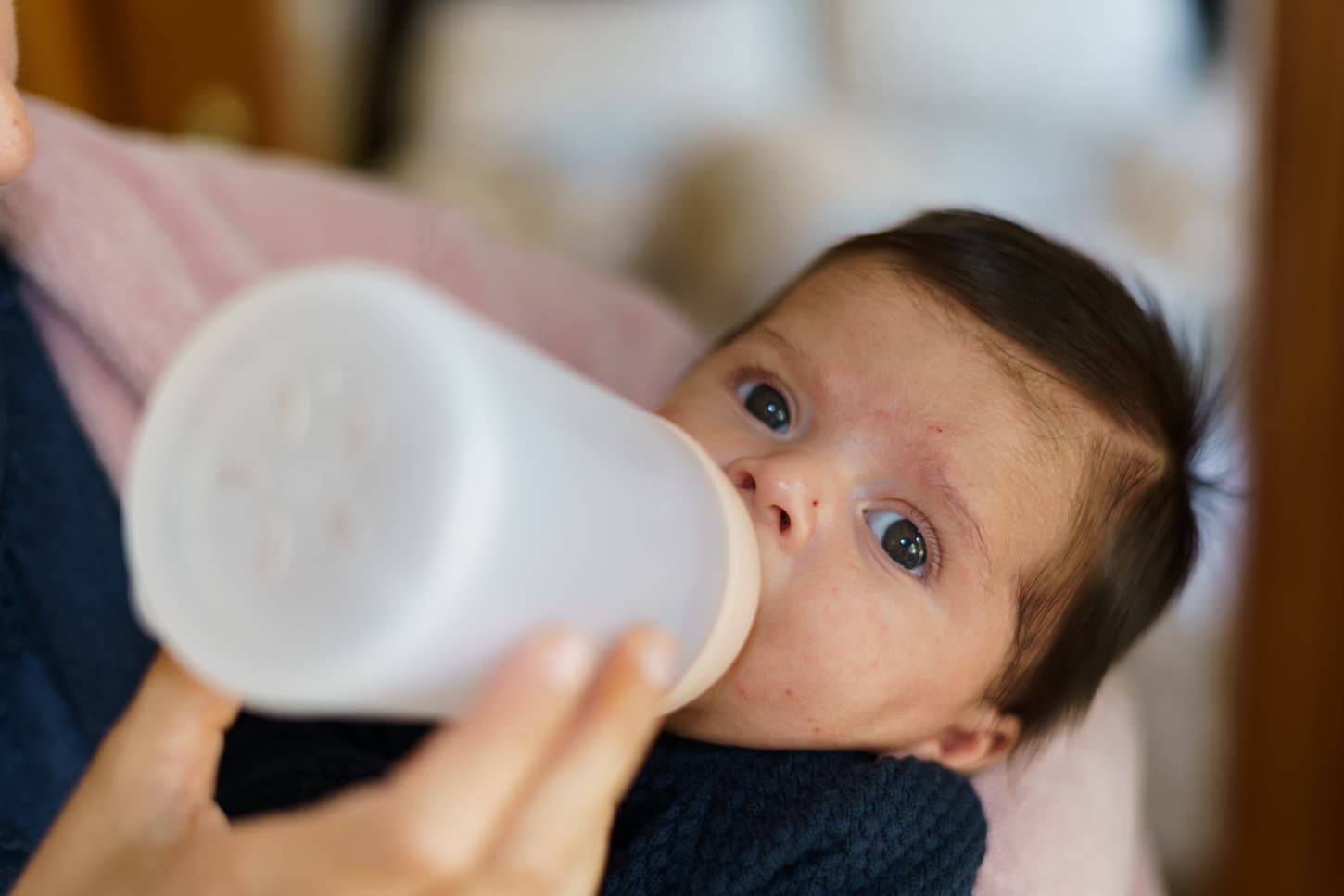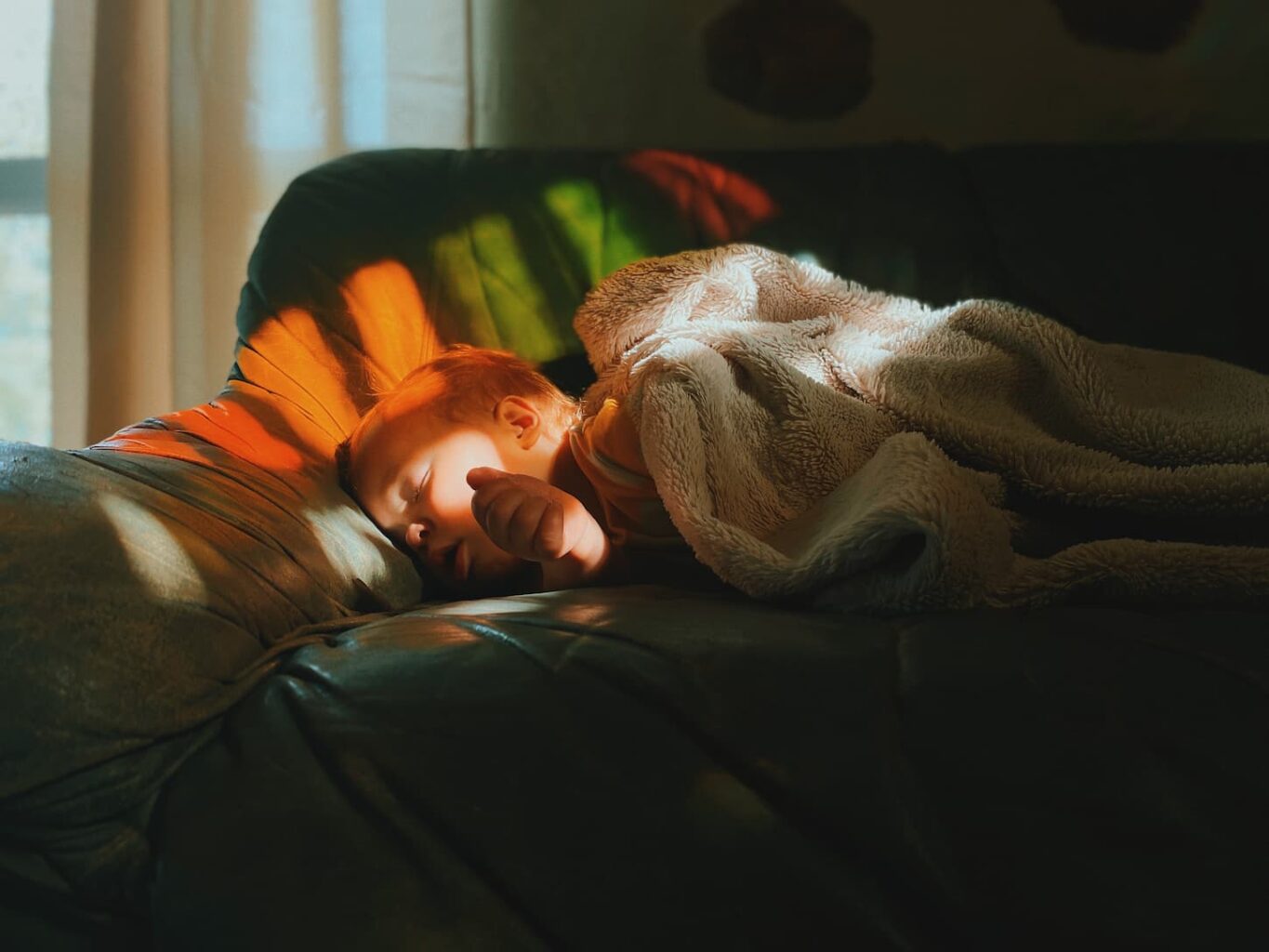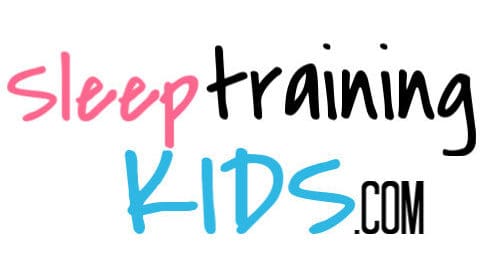Food and sleep are two of the most vital parts of a baby’s development, and as good parents, we want to get these things right. If your baby has missed a meal or regularly sleeps through mealtime, you might be wondering how long to let them sleep before waking them up to eat.
How long a baby can go without feeding depends on many things such as their age, weight, and development. A newborn baby shouldn’t go more than 2 to 5 hours without feeding, but this time gradually increases as the baby gets older.
Usually, babies will wake up for feeding, but sometimes they might sleep through and miss a meal. Lots of experts and pediatricians have different ideas about the ideal sleeping schedule for babies – and each baby develops at a different rate, so what is correct for one baby isn’t right for all.
If you want to know if you should wake your baby up for feeding, or leave them peacefully to their slumber, take a look at this vital information.

How Long Can a Newborn Sleep Without Feeding?
Newborns will usually wake up every two or three hours in the day and night for feeding. Feed newborns on demand, and they shouldn’t sleep for more than four or five hours without feeding. Newborns need a regular calorie intake so they can grow and develop.
Newborns need 17 hours of sleep in each 24-hour period. Newborns don’t have a sense of night and day, so they wake at regular intervals around the clock for feeding.
Newborn babies generally sleep for between 1 – 4 hours at a time, and they should be fed on demand, or every 2 – 3 hours, which adds up to around 8 to 12 feeds each 24 hours.
A newborn’s sleep pattern can be pretty erratic for the first few weeks. But around 6 to 8 weeks old, a baby will start getting into a routine.
At 4 months old, babies develop their circadian rhythm, which means they begin to get a sense of night and day and will usually start to sleep for longer at night.
By 6 months old, most babies can sleep for 6 to 8 hours without feeding, and from 9 months, most can sleep for 11 to 12 hours without waking up for a feed. From one year old, it’s perfectly normal and healthy for a baby to sleep all night without feeding them.
However, every baby is different, and some babies will sleep for longer at a young age while others will demand regular night feedings even up to 12 months old.
A study by the American Academy of Pediatrics in 2018 found that at 6 months old, 37.6 percent of infants don’t sleep for more than 6 hours per night, and only 57 percent sleep for 8 hours. At 12 months old, 27.9 percent of the babies in the study still didn’t sleep through the night.
The study also found that boys generally wake up more than girls, and that breastfeeding can potentially lead to more night waking. Formula milk takes longer to digest, so it can keep babies feeling fuller for longer.
Should You Let a Baby Sleep Through the Night Without Feeding?
Newborn babies are too young to sleep through the night without feeding, but from around 3 months, most babies can sleep for longer periods at night. However, each baby is different, so before you let a baby sleep through the night, speak about it with a pediatrician first.
A pediatrician will know when your baby is ready to sleep through the night without feeding. They will make the judgment depending on the baby’s health, weight, and development. Most babies will sleep through the night without feeding between 4 and 12 months old.
If a baby sleeps for more than 6 hours during the night, this is considered an overnight sleep cycle. To help a baby develop healthy sleeping and feeding habits, from 3 months old, create a feeding schedule for the baby. A baby can begin sleep training by about 5 or 6 months old.
What’s sleep training?
Sleep training is helping a baby develop a regular sleeping pattern. Good sleeping habits are beneficial for a baby’s health and development, and it’s good for parents so that they can get back to a sleeping routine as well.
Babies are usually developed enough to start sleep training at around 5 or 6 months old, but you should always check with a physician before starting sleep training.
Part of sleep training a baby is about teaching them how to fall asleep independently, without your comfort, and this is known as self-soothing.
Many babies depend on feeding or nursing to fall asleep, and during sleep training, this is known as a negative sleep association, along with holding and rocking the baby.
Sleep training aims to replace negative sleep associations with positive ones, which don’t involve the parent physically helping the baby get to sleep.
That being said, this is a whole other topic – and this site has tons of articles to help you on it, so make sure you use our search function to find any help you need! And if your question isn’t answered yet? Send it to us. We’d love to answer you directly and/or via a new article.

Should I Wake My Newborn to Feed at Night?
If a newborn regularly sleeps for long periods without waking up for food, it must wake up for feeding. Newborn babies must get all their nutritional needs because they develop so quickly. If newborn babies don’t get enough food, it can be bad for their health and development.
Newborns will often lose weight in the first few days after being born, and it can take two or three weeks to regain it, so regular feeding in the first few weeks is vital.
Premature babies must also wake up for extra feeding; Sometimes, premature babies might not show signs of hunger like full-term babies.
As babies get older, it’s better not to wake them up for feeding. Their sleep cycles are essential for their growth and development.
From around 3 months, as long as the baby is healthy, you might not have to wake them for feeding unless they’re underdeveloped, ill, or not gaining weight. Always get advice from a physician before letting a baby sleep through the night.
If a baby regularly sleeps through night feedings, make sure they’re getting enough of their food rations when they are awake. From 6 months old, a baby can start on solids and purees, which will give them extra calories and reduce the need for nighttime feedings.
Here’s a chart of exactly how much sleep a baby should get depending on their age. The total sleep time includes daytime naps.
| Age | Hours of Sleep in a 24-Hour Cycle |
|---|---|
| 0-3 months | 14 -17 |
| 4 – 12 months | 12 – 15 |
| 1-2 years | 11- 14 |
Keep in mind that these are averages based on surveying thousands of parents’ and pediatricians’ data available in online studies.
How Do You Wake Up A Sleeping Baby?
To wake up a baby for feeding, it’s better to wake them up slowly. Use gentle methods to start, such as talking to them or gentle stroking and touching. If this doesn’t work, undress the baby to cool them down or try lifting them out of the crib.
A parent’s voice alone might be enough to stimulate a baby, especially if they gently stroke their cheek or feet while they talk. If this doesn’t work, remove the baby’s blankets and clothing. The cool air will wake most babies up.
If your baby is still sound asleep after some undressing, it’s time to lift them out of the crib, but don’t cradle them – this will make them sleep more. Instead, hold the baby upright (supporting their neck as needed), so their body is straight. This is more stimulating for their brain.
If the baby is still sleeping, put them down for a diaper change or bathe them with a cool cloth to rouse them.
If all else fails, try giving the baby a bath to wake them up or putting some milk around their mouth to stimulate their hunger and feeding reflex.
Also, babies might not want to open their eyes if the light is too bright, so try dimming the lights if your baby is reluctant to wake up.

How do I Know If My Baby Is Getting Enough Milk?
To ensure a baby is getting enough milk, follow recommended feeding guidelines. A baby’s behavior can also show if they’re getting enough milk or not. Generally speaking, a well-fed baby is happy and alert, whereas a hungry baby will be grumpier and less active.
Food is one of a baby’s most essential needs, so it’s normal to worry if you’re giving them enough milk or not. To help make the judgment, here are some signs that a baby is getting enough milk:
- Your baby will be happy, content, satisfied, bright, and alert.
- Well-fed babies will gain weight at a healthy rate.
- A well-fed baby will produce around 6 to 8 dirty diapers a day and have regular bowel movements.
- Hunger can disturb a baby’s sleep, so a well-fed baby will usually sleep better.
And here are the signs that your baby isn’t getting enough milk:
- The baby will be quiet, less active, and may sleep too much.
- The baby might be cranky due to hunger.
- It’s harder for a hungry baby to settle down to sleep or sleep for long periods. Sleep problems may be related to hunger.
- If a baby isn’t getting enough milk, they will have fewer dirty diapers and bowel movements.
- Weight loss is a sign of under-feeding.
- An underfed baby might not reach development milestones.
For a precise idea about how much milk a baby needs, take a look at this table. It outlines how much milk a baby should drink by age and the average amount of feeding times in 24 hours.
| Milk in Weight | Feeding Times Per Day | Feeding Times Per Night | |
|---|---|---|---|
| 1 month | 2 – 3 oz | On-demand | On-demand |
| 2 months | 2 – 4 oz | On-demand | 3 – 4 |
| 3 Months | 3 -4 oz | 8 – 10 | 2 – 3 |
| 4 – 6 Months | 3 – 4 oz | 6 – 10 | 2 – 3 |
| 6 – 10 Months | 4 – 6 oz | 6 – 8 | 1 – 2 |
| 10 – 12 months | 4 – 6oz | 4 – 6 | 1 – 0 |
If your baby is breastfed, it can be hard to know if your baby is getting enough milk unless you pump, measure it, and then bottlefeed the baby. If that sounds like too much work, I agree!
This is when knowing the behavioral norms of properly fed versus hungry babies is super useful. That way, you can just feed your baby, watch their behavior, and know approximately how they’re doing without having to measure every little drop of milk.
If you’re concerned that the baby isn’t feeding enough, don’t hesitate to contact a health care professional such as your pediatrician for advice.
Reasons Why Babies Might Sleep for Longer
Every now and then, a baby might sleep for longer, which is perfectly normal. It could be that the baby simply needs to catch up on a few hours’ sleep, or they’ve had a busy and exciting day. Babies might also sleep for longer if they are ill or underfed.
If a baby is sleeping for longer and has other symptoms, such as loss of appetite or a temperature, there may be cause for concern.
If your baby is sleeping to the point where it’s difficult to rouse them, even for feeding, seek medical advice. If you can’t rouse your baby at all, this is a medical emergency, and please seek help right away.
Here are some reasons why a baby might oversleep sometimes:
- Not Eating Enough – If babies don’t get enough calories, they will become sleepy and lethargic
- Growth Spurt – It takes a lot of energy to grow, and during a growth spurt, a baby might sleep more.
- Illness – When babies are sick, they need to sleep more to recover from their illness. Always get advice from your doctor if your baby is ill.
- Missed Naps – if a baby misses naps during the day, they might compensate for it at night.

What Happens If My Baby Misses A Feed Because They’re Sleeping?
As long as a baby is over 8 weeks old, healthy, and well developed, it’s not a big deal if they miss a meal. A baby will probably try to make up for the missed calories in the next two or three feeds. They might also demand the next feeding earlier than scheduled.
Missing a feed can potentially disrupt a baby’s feeding schedule for a day or two while they make up their calories. It’s better not to skip any daytime feeds because the baby will probably wake up more during the night due to hunger.
There’s more to it than that, which is why you should read our article What Happens if Baby Skips a Feeding? next.
Best Products For Baby Sleep or Feed
Sometimes having the right product really makes a huge difference. Here are some of the products that can make life easier while parenting.
Having the right food for your baby is a huge win! Whether that means you breastfeed, use a specific formula, or mix and match, make sure your baby is fed and happy.
That being said, I know that sometimes formula shortages do happen (thank you, global supply chains). So don’t be afraid to search places like Amazon for formula if that’s your baby’s food of choice. Other online retailers will have options, too.
Having the right bottle to feed your baby can be another concern. Again, don’t be afraid to use Amazon’s search functionality to find bottles. This link will take you right to an Amazon search for bottles.
Again, you know your baby’s needs best. Some babies need a specific shape of bottle nipple, while other babies are less choosy. Find and use what works for you.
Key Takeaways and Next Steps
If a baby is less than 8 weeks old, then the usual guideline is to wake them up for feeding if they oversleep. At this age, they must get enough to eat to regain the weight they lost after birth. After this age, you don’t necessarily have to wake the baby up for feeding – it all depends on their age and development.
To know for sure if you need to wake your baby up for feeding, talk it through with a healthcare professional and always rule out health problems if the baby is sleeping too much.
Then, be sure to bookmark this site so we can keep helping you. Or go read this article next: Do You Feed Baby When Sleep Training? (Plus 11 Tips). It’s a popular one that has helped thousands of parents just like you.
Resources
Learning about parenting or sleep training techniques is important to learn from various reputable sources. These are the sources used in this article and our research to be more informed as parents.
- “12 Ways to Wake Your Sleepy Baby Up to Breastfeed.” Verywell Family, 28 Oct. 2021, www.verywellfamily.com/breastfeeding-a-sleepy-baby-431589#:%7E:text=Touch%20your%20baby%3A%20Ease%20your,t%20so%20warm%20and%20comfortable.
- Barry, Elaine S. “What Is ‘Normal’ Infant Sleep? Why We Still Do Not Know.” Psychological Reports, vol. 124, no. 2, 2020, pp. 651–92. Crossref, doi:10.1177/0033294120909447.
- Brown, Amy, and Victoria Harries. “Infant Sleep and Night Feeding Patterns During Later Infancy: Association with Breastfeeding Frequency, Daytime Complementary Food Intake, and Infant Weight.” Breastfeeding Medicine, vol. 10, no. 5, 2015, pp. 246–52. Crossref, doi:10.1089/bfm.2014.0153.
- “How Much to Feed Your New Baby.” WebMD, 30 June 2017, www.webmd.com/parenting/baby/new-baby-eating-enough.
- Montgomery, Steph, and Tiffany Eve Lawrence. “Is My Baby Eating Enough? 6 Signs Your Baby Needs More To Eat.” Romper, 11 Sept. 2021, www.romper.com/parenting/is-your-baby-eating-enough-here-are-6-red-flags-every-parent-should-know-8038149.
- “Newborn Sleep: Should I Wake My Baby for Feedings?” Mayo Clinic, 26 Feb. 2022, www.mayoclinic.org/healthy-lifestyle/infant-and-toddler-health/expert-answers/newborn/faq-20057752?reDate=26032022.
- Pennestri, Marie-Hélène. “Uninterrupted Infant Sleep, Development, and Maternal Mood.” American Academy of Pediatrics, 1 Dec. 2018, www.publications.aap.org/pediatrics/article-split/142/6/e20174330/37494/Uninterrupted-Infant-Sleep-Development-and.
- Sissons, Claire. “When Do Babies Sleep Through the Night? Tips and Guidance.” Medical News Today, 20 May 2020, www.medicalnewstoday.com/articles/when-do-babies-sleep-through-the-night.
- Villines, Zawn. “Is My Newborn Sleeping Too Much?” Medical News Today, 30 Sept. 2021, www.medicalnewstoday.com/articles/322565#how-long-do-newborns-sleep.
- Whelan, Corey. “What’s the Average Baby Weight by Month?” Healthline, 1 July 2019, www.healthline.com/health/parenting/average-baby-weight.
